


Top 10 Best Influencer Outreach Tools
As influencer marketing continues to grow, managing outreach manually has become time-consuming and complex. That’s where influencer outreach tools come in — helping you find creators, manage collaborations, and track performance all in one place.
Choosing the right tool is essential for brands of all sizes. Whether you’re a small business just starting with influencer partnerships or a large enterprise looking to scale your campaigns, the right platform can streamline your workflow, boost efficiency, and maximize ROI. These tools offer key features such as influencer discovery, automated outreach, performance tracking, and seamless eCommerce integrations.
To help you find the best fit for your needs, we’ve reviewed the top 10 influencer outreach tools for 2025:
Each platform brings unique strengths to help you connect, collaborate, and grow your influencer marketing campaigns effectively.
Why Are Influencer Outreach Tools Important
Influencer outreach tools are essential for brands aiming to effectively connect with influencers, manage relationships, and execute successful campaigns. These platforms streamline the outreach process, enhance targeting precision, and facilitate scalable collaboration, ultimately driving better marketing outcomes.
Key Benefits of Influencer Outreach Tools
- Efficient Influencer Discovery: Advanced search filters enable brands to identify influencers based on specific criteria such as niche, audience demographics, engagement rates, and platform presence. This targeted approach ensures alignment with campaign objectives.
- Streamlined Communication: Integrated messaging systems allow for centralized communication with influencers, simplifying coordination and reducing the risk of missed interactions.
- Campaign Management: Tools often include features for tracking campaign progress, setting timelines, and managing deliverables, ensuring that all parties are aligned and deadlines are met.
- Performance Analytics: Built-in analytics provide insights into campaign performance, helping brands measure ROI and adjust strategies as needed.
- Scalability: As influencer marketing efforts grow, these tools facilitate the management of larger influencer networks and more complex campaigns without compromising efficiency.
Why It Matters for Your Brand
Leveraging influencer outreach tools can significantly enhance the effectiveness and efficiency of your campaigns. By automating and optimizing various aspects of influencer collaboration, these tools enable brands to build stronger relationships, reach targeted audiences more effectively, and achieve measurable results.
Top 10 Influencer Outreach Tools
1. Influencer Hero
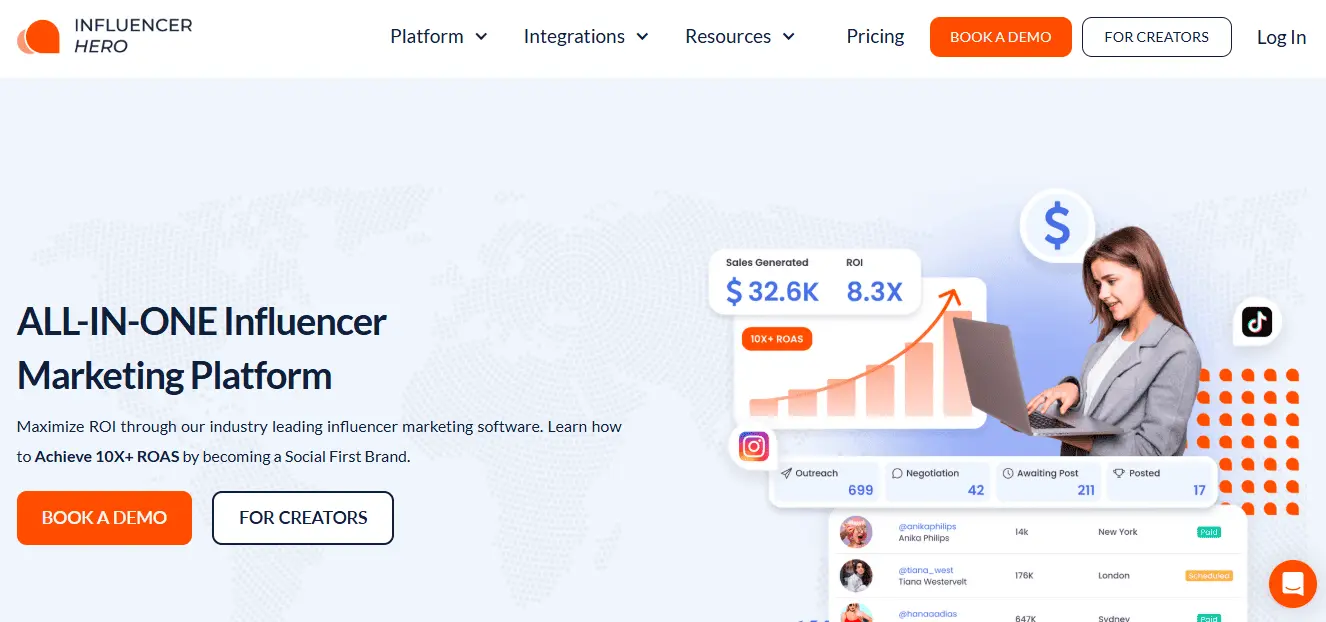
Pricing: Influencer Hero offers flexible pricing plans that grow with your brand. Each tier includes all core features, such as influencer discovery, CRM integration, and campaign analytics.
- Standard: $649/month — up to 1,000 creators
- Pro: $1,049/month — up to 5,000 creators
- Business: $2,490/month — up to 10,000 creators
- Custom & Agency: Tailored pricing based on specific brand or agency needs
Best For: Brands and agencies seeking an all-in-one influencer marketing platform designed to simplify influencer discovery, automate outreach, and track campaign performance from a single dashboard.
Why It Stands Out:
- Automated Outreach Campaigns: Streamline communication with customizable templates and automated email sequences that scale your outreach efforts efficiently.
- Influencer Discovery & CRM Integration: Find creators based on niche, audience demographics, and platform — and manage every relationship through a unified CRM.
- Campaign Tracking & Reporting: Get in-depth insights into campaign performance, engagement metrics, and ROI to evaluate what drives real results.
- Customizable Email Templates: Save time and improve personalization with templates tailored to each influencer’s profile and audience.
Pros
- Multi-Platform Coverage: Supports 8 major social platforms, including Instagram, TikTok, YouTube, and Twitch
- Excellent Customer Support: Dedicated account managers and live chat praised by users
- Automated Outreach: Saves time with AI-personalized email flows and drip campaigns
- AI-Powered CRM: Built to handle large-scale seeding and outreach efficiently
Cons
- No Built-In Whitelisting for Ads: Lacks native tools for managing paid media.
- Mild Learning Curve: While user-friendly, some users may need time to explore the platform’s full feature set.
2. GRIN
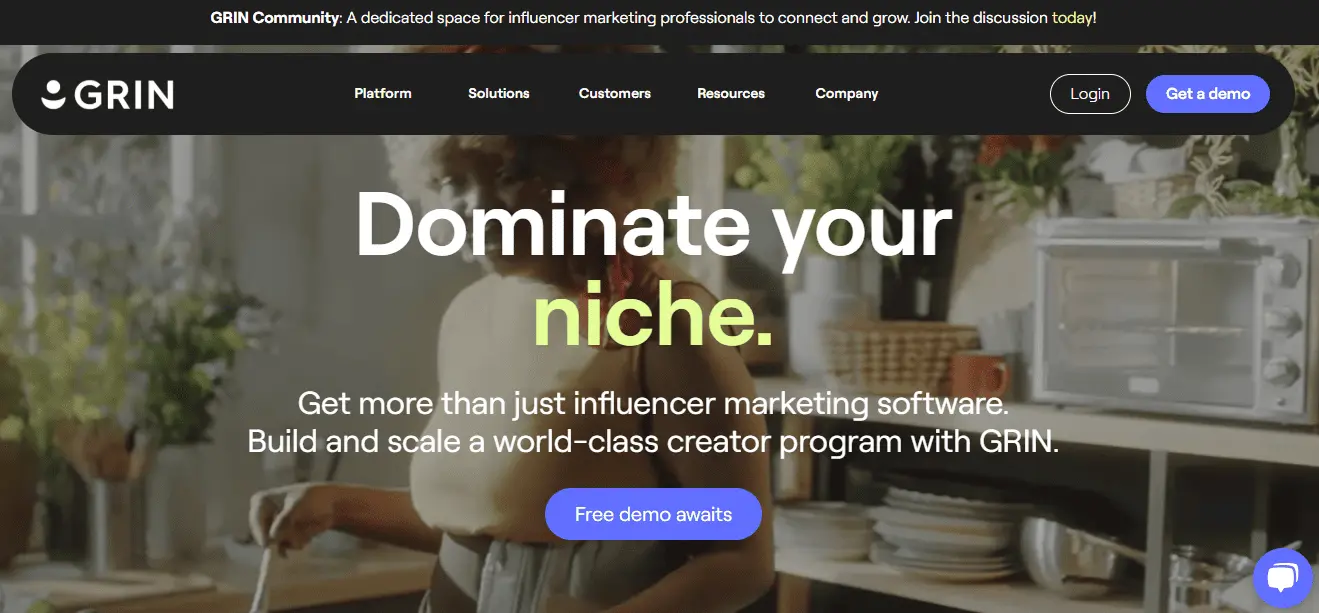
Pricing: GRIN offers enterprise-level plans tailored to brands with ongoing influencer programs. Pricing depends on feature needs and campaign volume.
- Starting Price: From $25,000/year (monthly payment options available)
- Advanced Plans: Can exceed $10,000+/year based on scale and integrations
- Contract Terms: Requires a 12-month minimum commitment
Best For: DTC and eCommerce brands looking to manage the entire influencer marketing workflow — from creator discovery and outreach to gifting, payments, and performance tracking — all within one platform.
Why It Stands Out:
- AI-Powered Influencer Discovery: Uses AI to match your brand with ideal creators based on keywords, engagement data, and audience insights.
- Comprehensive Campaign Management: Streamlines outreach, onboarding, contracts, and payments in one unified dashboard.
- Seamless eCommerce Integration: Syncs directly with Shopify to simplify product gifting, track sales, and manage affiliate programs.
- Centralized Content Library: Stores and organizes all user-generated content (UGC) for easy reuse across campaigns.
- Real-Time Performance Analytics: Provides detailed reports on influencer activity, campaign ROI, and revenue impact.
Pros
- Comprehensive CRM: Fully integrated CRM to track influencer interactions, contracts, and relationships.
- Advanced Analytics: Provides in-depth performance and ROI tracking, helping to measure the success of campaigns.
- Unlimited Creator Partnerships: No limits on the number of influencers you can collaborate with.
- AI Discovery Tools: Makes finding the perfect influencers easy with lookalike searches and AI-powered recommendations.
Cons
- High Price Point: The cost of GRIN can be a barrier for smaller brands.
- Complex Interface: Some users report that the platform can be overwhelming due to the extensive feature set.
- Lack of Paid Ads Tools: GRIN does not have native tools to boost influencer content via paid social ads.
- Pricing Transparency: Some users mention that pricing transparency during the sales process could be improved.
3. Pitchbox
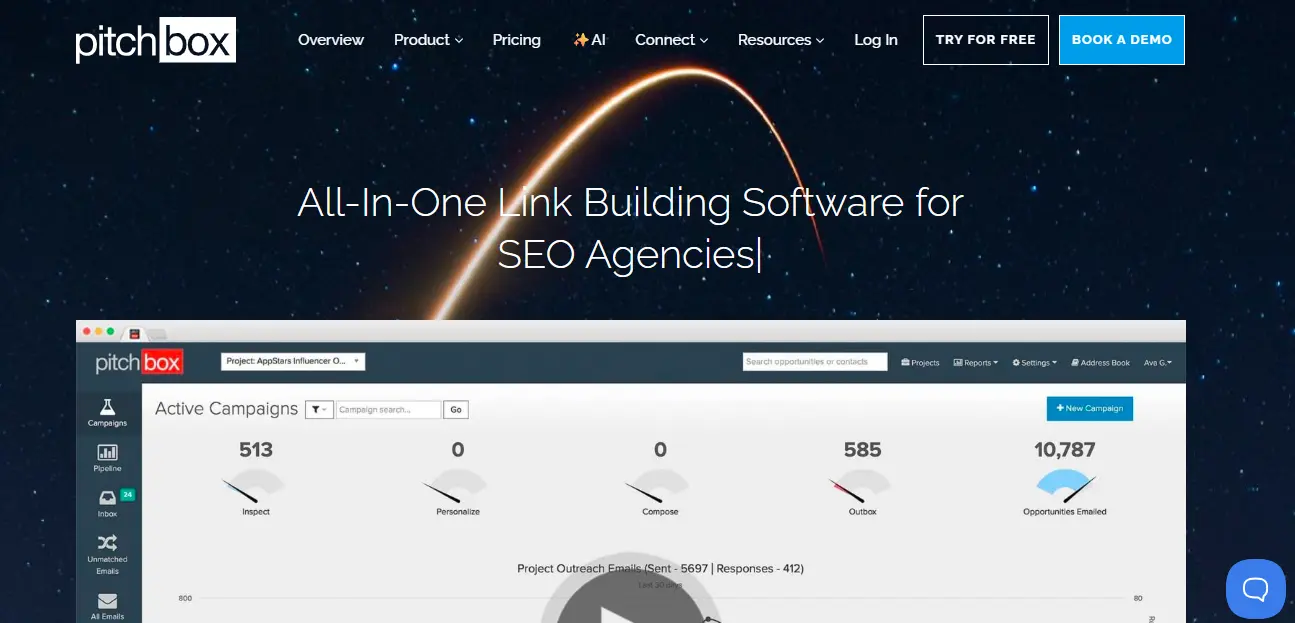
Pricing: Pitchbox pricing varies based on the number of users and campaigns, with plans designed to suit different team sizes and goals.
- Pro: $165/month — ideal for link builders managing a single website
- Advanced: $420/month — suitable for growing agencies handling multiple clients
- Scale: $675/month — designed for teams scaling up outreach and campaigns
Best For: Brands and agencies seeking advanced outreach and link-building tools, perfect for scaling influencer campaigns and managing long-term relationships.
Why It Stands Out:
- Outreach Automation: Send personalized emails at scale using dynamic templates to save time while maintaining authenticity.
- Advanced Campaign Management: Track influencer relationships with task assignments, follow-up scheduling, and performance monitoring.
- Link-Building Focus: Perfect for campaigns that prioritize backlinks and SEO growth alongside influencer marketing.
- Analytics & Reporting: Access real-time metrics on outreach performance, engagement rates, and influencer response.
- CRM Integration: Seamlessly syncs with existing CRMs to manage influencer data and interactions efficiently.
Pros
- Scalable Outreach: Excellent for businesses looking to scale their influencer outreach efforts with automated campaigns.
- Advanced Email Customization: Create customized templates and track email performance.
- SEO Integration: Focus on link-building makes it a great choice for SEO-driven influencer campaigns.
- Performance Tracking: Real-time campaign tracking for better optimization and influencer engagement.
Cons
- Limited Social Features: Lacks robust social media analytics and performance tracking compared to other platforms.
- Learning Curve: It can take time to get used to the platform, especially with advanced features.
- No Social Media Focus: Primarily designed for outreach, not ideal for influencer campaigns focused on content creation or engagement.
- Higher Price Point: Can be costly for small brands that don’t require the full suite of features.
4. BuzzStream

Pricing: BuzzStream offers flexible pricing based on features and team size:
- Starter Plan: $24/month — ideal for small teams or brands beginning influencer outreach
- Higher-Tier Plans: Scalable options available with additional features for larger teams and complex campaigns
Best For: Brands and agencies focused on digital PR and relationship-based outreach, ideal for building long-term influencer relationships and managing outreach campaigns efficiently.
Why It Stands Out:
- Influencer Discovery: Find influencers based on niche, location, and previous work to ensure the right fit for your campaigns.
- Relationship Management: Track communications, contacts, and follow-ups to maintain strong, long-term influencer relationships.
- Campaign Management: Organize outreach campaigns with task tracking, deadlines, and approval workflows for seamless execution.
- Reporting & Analytics: Gain insights into engagement, response rates, and overall campaign performance.
- Customizable Outreach Templates: Create and save tailored templates to streamline communications while keeping messages personalized.
Pros
- Relationship Management: Excellent tools for building and managing long-term influencer relationships.
- Campaign Workflow: Helps manage outreach campaigns with deadlines, approval workflows, and task assignments.
- Customizable Templates: Save time with customizable outreach templates, improving efficiency in outreach.
- Affordable: Pricing is reasonable for small to medium-sized businesses, making it accessible for brands just starting out.
Cons
- Limited Influencer Discovery: Search functionality is not as robust as some other platforms, especially for niche creators.
- Limited Analytics: Some users report that BuzzStream’s analytics could be more detailed, especially for campaign ROI tracking.
- Basic Reporting: Lacks advanced reporting tools, such as real-time data or influencer performance insights.
- Not Ideal for Large-Scale Campaigns: May not scale well for brands with very large influencer networks or complex campaigns.
5. Heepsy
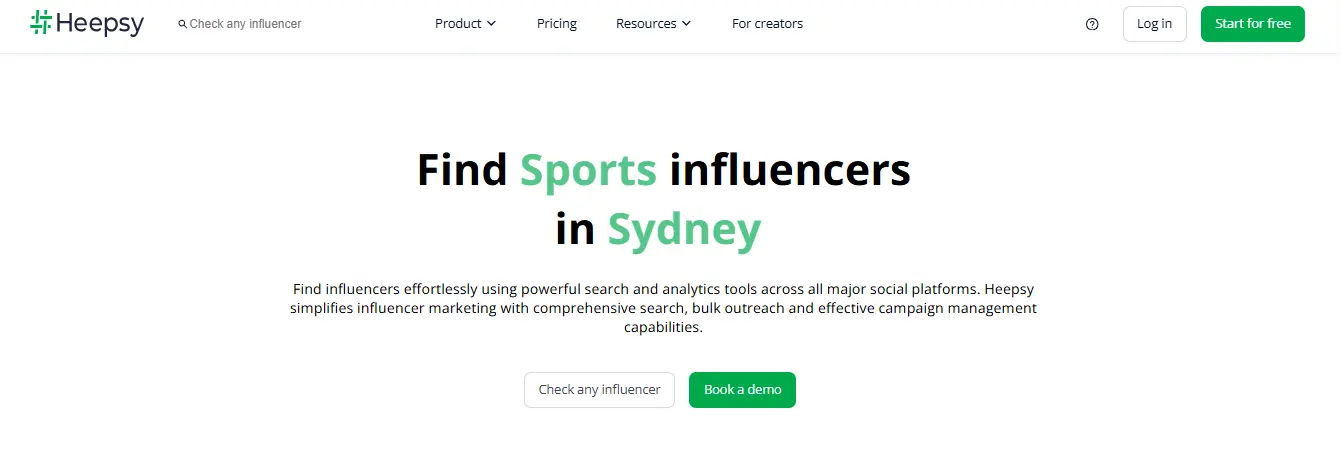
Pricing: Heepsy offers tiered plans to suit different levels of access and features:
- Plus Plan: $99/month — Includes influencer search, campaign management, and engagement metrics
- Advanced Plan: $249/month — Adds Shopify integration, affiliate sales tracking, and enhanced campaign tracking
- Enterprise Plan: Custom pricing — Designed for larger businesses with complex needs and high-volume influencer partnerships
Best For: Small to medium-sized brands looking for an affordable, easy-to-use platform for influencer search and discovery.
Why It Stands Out:
- Influencer Search: Advanced filters help brands find the right creators based on location, audience demographics, engagement, and niche.
- Fake Follower Detection: Identify influencers with fraudulent followers to ensure high-quality partnerships.
- Multi-Platform Support: Discover influencers across Instagram, TikTok, YouTube, and more, making it easy to reach audiences on key platforms.
- Campaign Tracking: Track basic campaign performance, monitor influencer content, and measure engagement metrics.
- User-Friendly Interface: Clean, intuitive design makes influencer discovery and campaign management quick and simple.
Pros
- Affordable: Heepsy offers a low-cost entry point, ideal for small businesses or startups.
- Fake Follower Detection: Ensures influencer authenticity by identifying fake followers and ensuring your brand’s message reaches real audiences.
- User-Friendly Interface: The intuitive interface makes it easy for beginners to search and connect with influencers.
- Multi-Platform Support: Search for influencers across various platforms including Instagram, TikTok, and YouTube.
Cons
- Limited Campaign Management: Heepsy is focused primarily on discovery, lacking robust tools for full campaign management.
- Basic Analytics: Lacks the in-depth analytics and performance tracking needed for larger or more performance-driven campaigns.
- No Email Outreach Tools: Heepsy does not provide email outreach or automated communication features, requiring external tools.
- Limited Integrations: Heepsy does not offer as many integrations with eCommerce or CRM platforms as some other influencer tools.
6. Modash
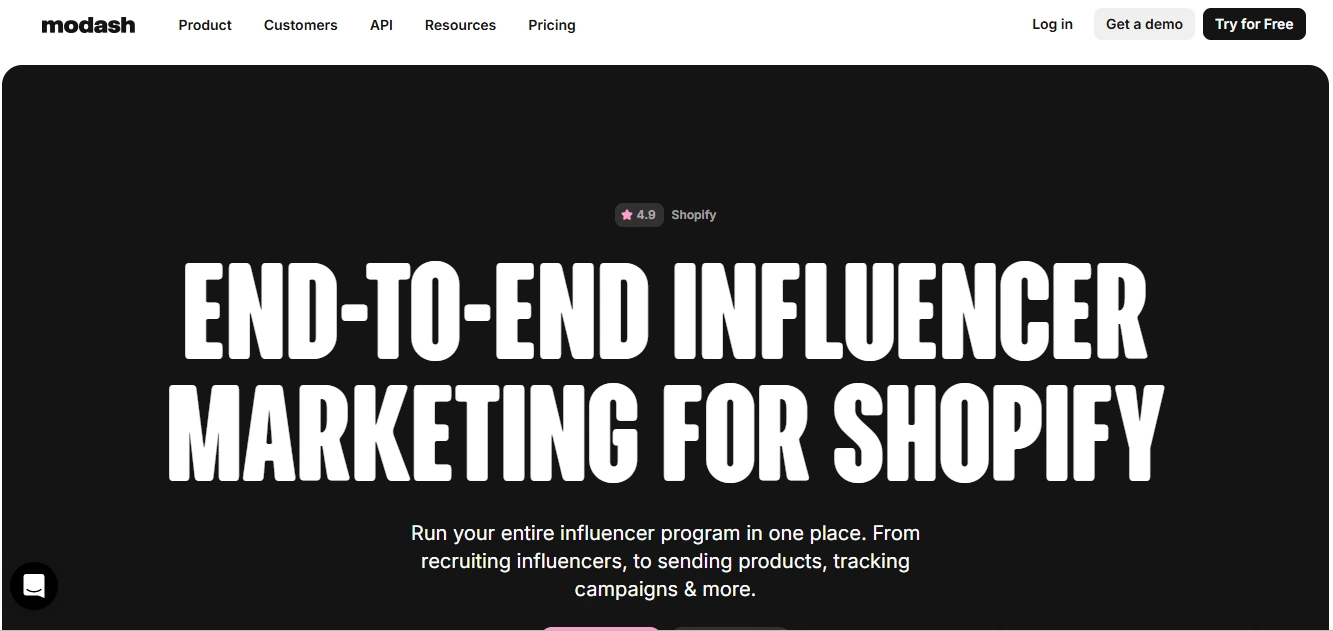
Pricing: Modash offers tiered plans to accommodate different campaign sizes and feature needs:
- Essential Plan: $199/month (billed annually) — Contact up to 100 creators per month
- Performance Plan: $499/month (billed annually) — Contact up to 250 creators per month and access Shopify integration
- Enterprise Plan: Custom pricing — Tailored solutions for brands with complex needs or high-volume campaigns
Best For: Brands seeking data-driven influencer marketing with advanced discovery and outreach capabilities, especially for large-scale influencer campaigns.
Why It Stands Out:
- Influencer Discovery: Search over 350 million public influencer profiles using advanced filters for niche topics, engagement rates, audience location, and more.
- AI-Powered Discovery: Tools like Find Your Fans and Describe a Vibe help identify influencers who match your brand’s aesthetic or target audience.
- Campaign Management: Manage campaigns end-to-end, from outreach to content tracking, with integrated email and DM outreach.
- Analytics & Insights: Track engagement, audience quality, fake follower detection, and overall campaign performance.
- Affiliate Marketing: Automate affiliate tracking, commission management, and payouts directly through the platform.
Pros
- Massive Creator Database: Access to 350M+ public influencer profiles, making discovery broad and diverse.
- Advanced Filters and AI Discovery: Powerful filters and AI tools help brands identify the most relevant influencers quickly.
- Bulk Outreach: Send templated outreach emails to hundreds of influencers at once, saving time on communication.
- Affiliate and Commission Management: Automates the tracking and payment of affiliate commissions, making it ideal for performance campaigns.
Cons
- Limited eCommerce Integrations: Only integrates with Shopify, limiting some brands that use other platforms like WooCommerce.
- No Built-In Content Licensing: UGC rights management must be handled manually or outside the platform.
- No Paid Ad Integration: Modash does not allow for boosting influencer content as paid ads directly through the platform.
- High Price for Small Brands: The platform is more expensive compared to simpler influencer marketing tools.
7. Upfluence
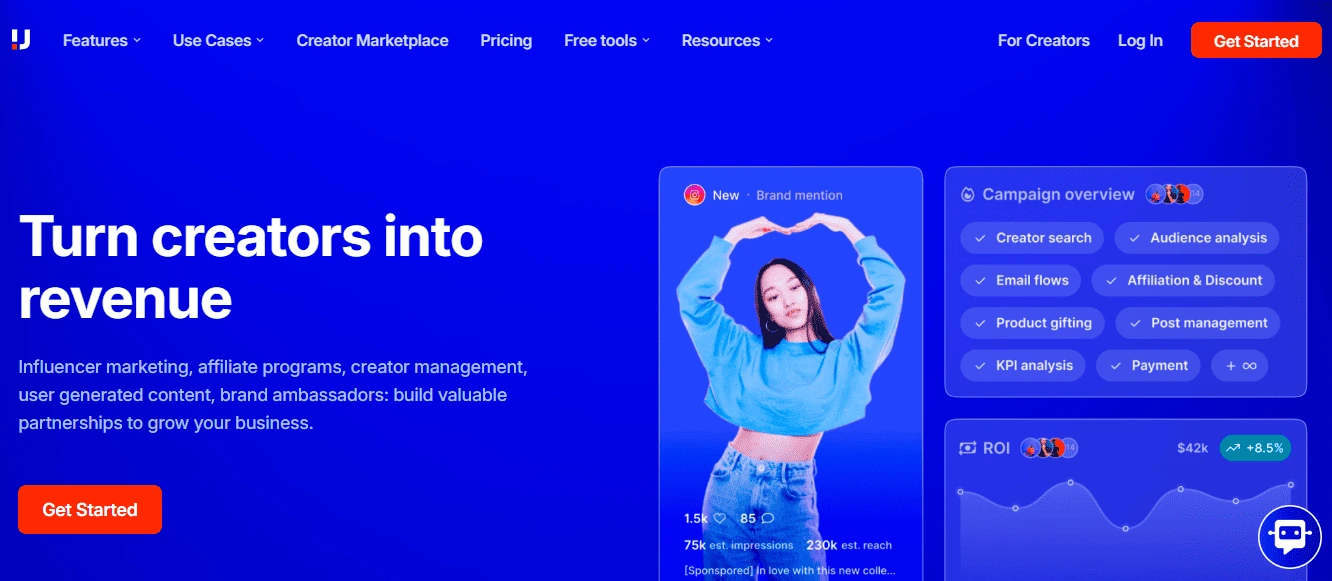
Pricing: Upfluence offers customized pricing based on business size and feature requirements:
- Standard Plan: $1,276/month (annual term, billed monthly)
- Optional Payments Feature: $399 — can be removed if using the platform only for gifting
- Contract Terms: Annual contracts with quarterly options available
- No Commissions: Pricing does not include fees based on sales or influencer volume
Best For: Mid-to-large-sized brands seeking an all-in-one influencer marketing platform with robust analytics, campaign management, and seamless eCommerce integrations.
Why It Stands Out:
- AI-Powered Influencer Discovery: Access a vast influencer database with smart recommendations tailored to your campaign goals.
- Campaign Management Tools: Centralized platform for managing influencer outreach, content creation, and payments.
- eCommerce Integrations: Seamlessly connects with Shopify, WooCommerce, and social media platforms for streamlined workflows.
- Analytics & Performance Tracking: Gain in-depth insights into campaign reach, engagement, and ROI.
- Customizable Reporting: Generate and share reports based on key metrics to align teams and optimize campaigns.
Pros
- Ease of Use: User-friendly interface with an intuitive dashboard, praised for easy setup and management.
- Comprehensive Analytics: Provides in-depth analytics for tracking influencer performance and ROI.
- Advanced Integrations: Seamless eCommerce and social media integrations (Shopify, WooCommerce, etc.).
- Influencer Discovery: Powerful AI-driven influencer search with recommendations based on brand needs.
Cons
- High Cost: Pricing may be prohibitive for smaller brands or startups.
- Limited Search Functionality: Some users report challenges in finding niche influencers with precision.
- Learning Curve: The platform’s vast feature set may take time for new users to master.
- Customer Support: Response times may vary, especially during peak hours.
8. Afluencer
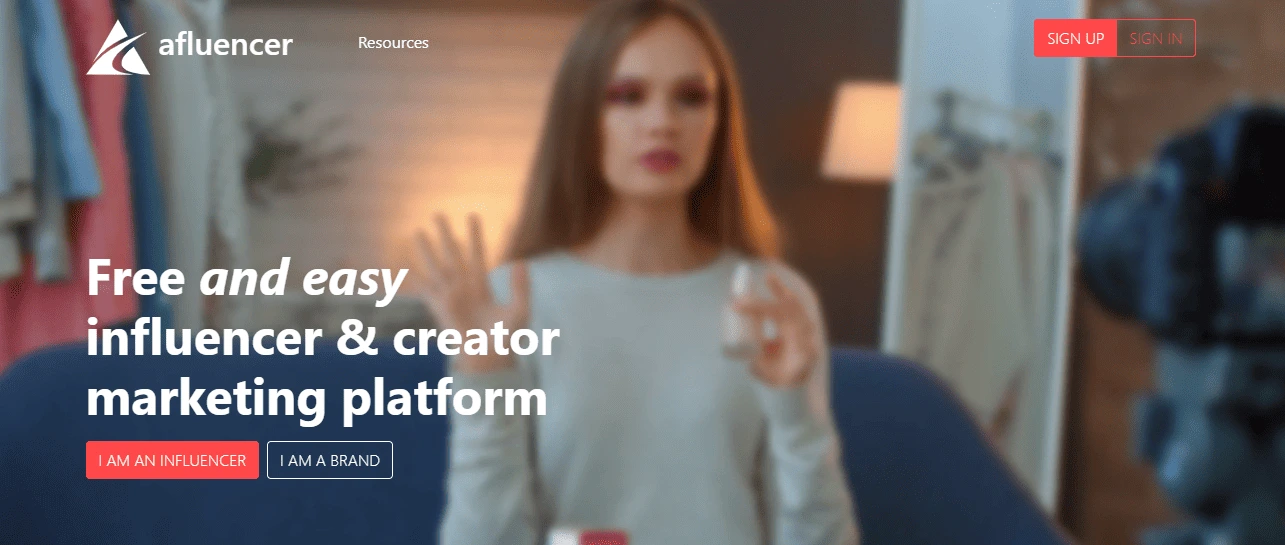
Pricing: Afluencer offers flexible pricing to accommodate different campaign sizes:
- Starter Plan: $99/month — ideal for small to mid-sized campaigns
- Custom Plans: Tailored pricing for larger campaigns or enterprise-level needs
Best For: Brands seeking a marketplace to connect with influencers for collaborations, with tools for campaign management and performance tracking.
Why It Stands Out:
- Influencer Marketplace: Connect directly with influencers actively seeking collaboration opportunities.
- Campaign Management: Manage influencer communications, content creation, and performance tracking in one place.
- Custom Project Creation: Post specific collaboration opportunities, allowing influencers to apply directly and streamlining outreach.
- Analytics & Tracking: Access reports on influencer performance, engagement, and ROI.
- Integration: Seamlessly integrates with Shopify and other eCommerce platforms for efficient gifting and tracking.
Pros
- Easy-to-Use Marketplace: Afluencer’s marketplace helps brands quickly connect with influencers.
- Customizable Campaigns: Brands can create tailored projects and invite influencers to apply.
- Affordable: Pricing is accessible for small-to-medium businesses, making it suitable for those just starting with influencer marketing.
- Integration with Shopify: Works well for eCommerce brands with gifting and sales tracking.
Cons
- Limited Advanced Features: Some users find the platform lacking in advanced features like AI-powered influencer search.
- Lower Control Over Influencer Selection: Since influencers apply, brands may have less control over the selection process.
- Limited Analytics: Basic reporting tools that may not be sufficient for performance-focused brands with large influencer programs.
- Focus on Small Influencers: Mainly caters to micro and nano influencers, which may limit scalability for larger brands or specific needs.
9. CreatorIQ
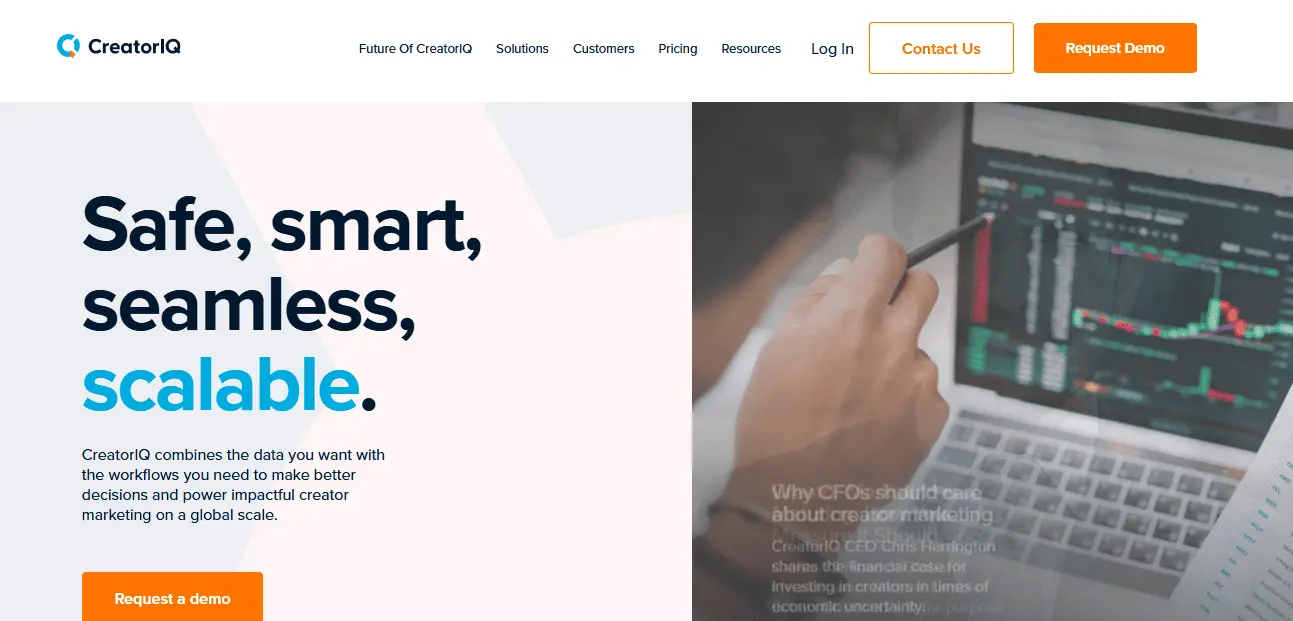
Pricing: CreatorIQ offers customized enterprise pricing based on organizational needs:
- Typical Plans: Start at $35,000–$36,000 per year (approximately $2,350/month) with an annual contract.
- Model: Per-user, enterprise-tier pricing; no monthly or flexible options
- Free Trial: Available upon request after a demo
Best For: Enterprise-level businesses seeking comprehensive influencer marketing lifecycle management, with advanced analytics and seamless integrations.
Why It Stands Out:
- Full Influencer Lifecycle Management: Manage everything from discovery and activation to campaign execution and reporting.
- AI-Powered Discovery: Use machine learning to identify influencers who align with your campaign goals and performance metrics.
- CRM & Email Automation: Dedicated tools for managing influencer relationships with integrated email outreach.
- Advanced Analytics & Reporting: Generate in-depth, customizable reports on influencer performance, engagement, and ROI.
- Enterprise Integrations: Seamlessly connects with Shopify, WooCommerce, and other enterprise eCommerce platforms.
Pros
- Enterprise-Level Tool: Perfect for large organizations with complex influencer programs.
- Advanced AI Discovery: CreatorIQ’s AI-powered influencer search is highly effective for identifying ideal matches.
- Customizable Reporting: Offers detailed reporting and analytics that can be tailored to specific KPIs.
- Seamless Integrations: CreatorIQ integrates well with Shopify and other eCommerce tools, making it great for sales-focused campaigns.
Cons
- High Pricing: The platform is expensive, which may not be feasible for smaller businesses or those with limited budgets.
- Complex Setup: Due to the platform’s comprehensive features, onboarding can be time-consuming and complicated.
- Learning Curve: The platform’s extensive features might be overwhelming for new users or those unfamiliar with enterprise software.
- Limited Support for Small Brands: Larger brands might benefit more from the full set of features than smaller businesses with fewer resources.
10. Sprout Social
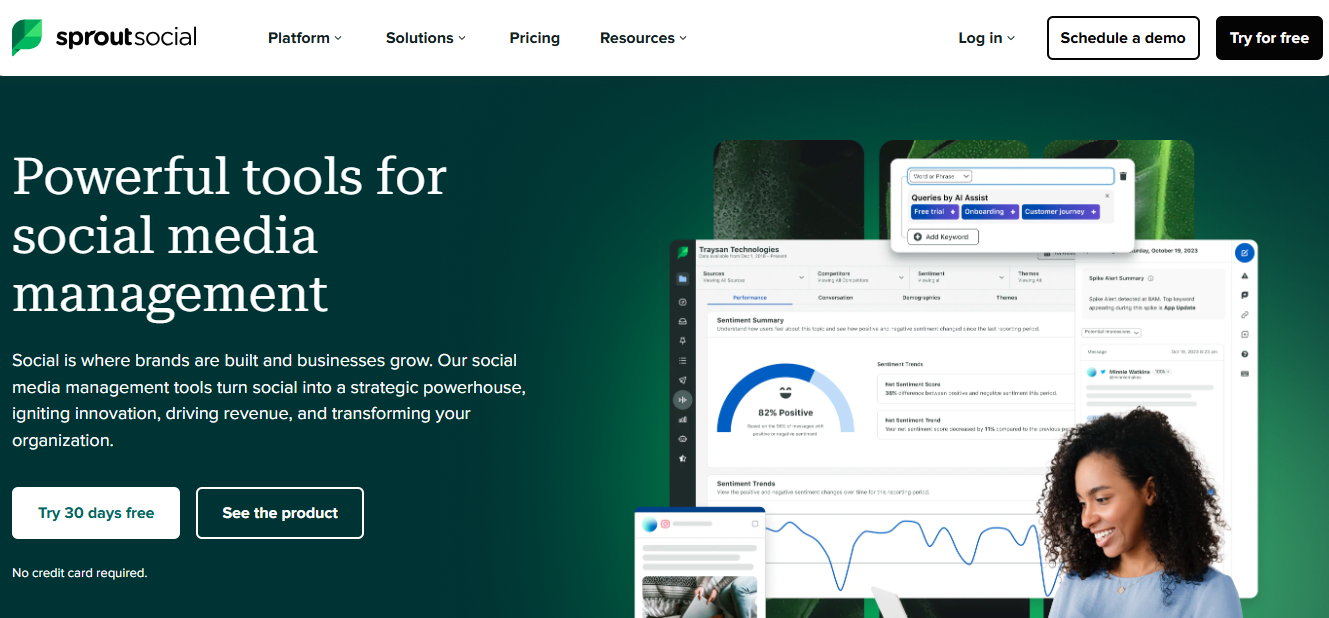
Pricing: Sprout Social pricing is based on brand needs and team size:
- Base Plan: Starts at $1,600/month per user, plus $600 per additional user
- Payment Terms: Monthly or annual billing available, with a full-year commitment required
- Annual Investment: Approximately $19,200 for one user, $25,200 for a team of two
Best For: Brands looking for a full-service social media management platform with integrated influencer marketing tools, ideal for campaign tracking, influencer discovery, and overall social media performance.
Why It Stands Out:
- Influencer Discovery: Identify influencers based on engagement, location, interests, and audience relevance.
- Campaign Tracking: Monitor performance across social media channels, tracking reach, engagement, and content effectiveness.
- Brand Safety Features: Automatically filter influencers that could pose risks based on flagged keywords or past content.
- Social Media Management: Beyond influencer campaigns, schedule posts, interact with followers, and manage overall social media presence.
- Reporting & Analytics: Access comprehensive reports, including earned media value (EMV), audience growth, and influencer campaign performance.
Pros
- Comprehensive Social Media Management: All-in-one platform for managing social media and influencer marketing.
- Influencer Discovery: Advanced filters make it easy to find influencers based on engagement, location, and more.
- Brand Safety: Sprout Social offers strong brand safety filters to ensure campaigns align with your brand’s values.
- Advanced Reporting: Detailed insights into campaign performance, including EMV and engagement rates.
Cons
- High Price Point: The platform’s pricing can be expensive, especially for small businesses on a tight budget.
- Limited Bulk Outreach: Bulk outreach features are not as robust as other platforms, which could limit scalability for large campaigns.
- Limited Integrations: While it integrates well with social platforms, Sprout Social may not have as many eCommerce-specific integrations.
- No UGC Rights Management: Does not offer content licensing or UGC management, which could be a limitation for certain campaigns.
Final Thoughts on the Top 10 Best Influencer Outreach Tools
The best influencer outreach tool depends on your brand’s size, goals, and budget. Small brands can start with Heepsy or Afluencer for simple, affordable discovery, while growing teams may prefer GRIN, Upfluence, or Modash for full campaign management and analytics. Enterprise brands will benefit from CreatorIQ or Sprout Social for advanced, data-driven influencer programs.
Among these, Influencer Hero stands out as an all-in-one solution, combining AI-powered discovery, CRM, and campaign tracking — perfect for brands looking to scale efficiently and measure real ROI. The right platform saves time, streamlines workflows, and turns influencer marketing into measurable growth.
From enterprise solutions like CreatorIQ, Traackr, and Sprout Social to accessible options such as Heepsy, HypeAuditor, and Modash, each platform offers distinct advantages depending on your brand’s size and goals. Enterprise tools excel in data depth and integrations, while smaller platforms prioritize usability and affordability.
When it comes to balancing functionality, automation, and price, Influencer Hero stands out as the most complete solution. It combines advanced analytics, AI-driven outreach, and seamless eCommerce integrations, offering enterprise-level performance without the high cost. For brands seeking an all-in-one platform to manage discovery, tracking, and optimization, Influencer Hero is the clear winner.



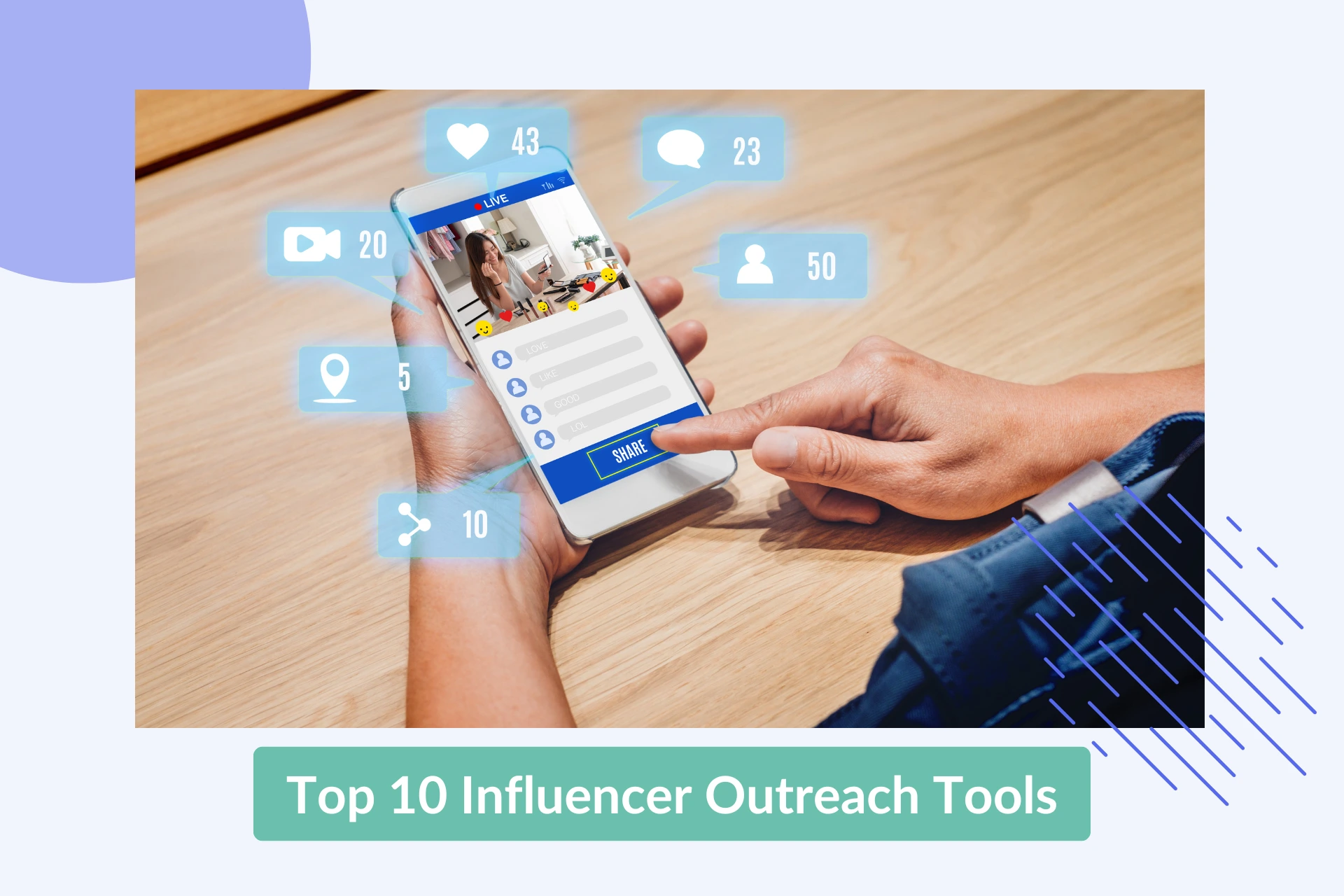

.svg)

%201.png)












_logo.svg.png)








